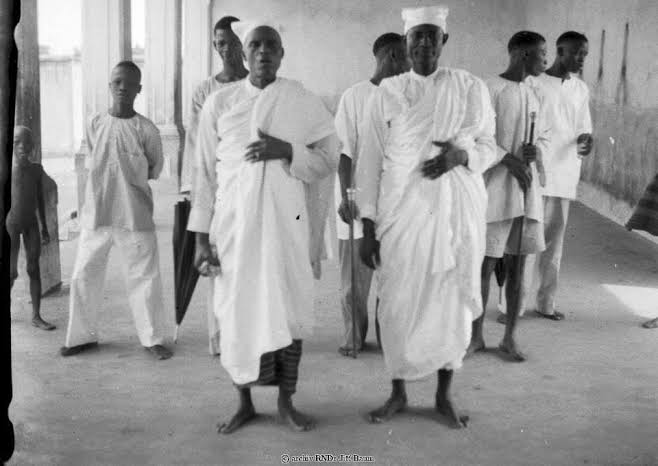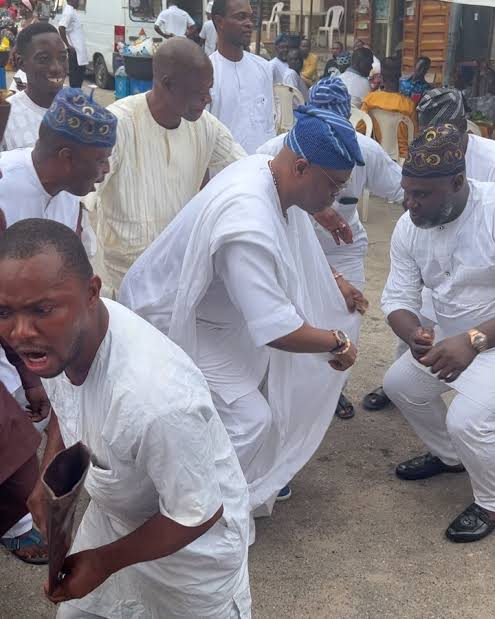Lagos is Nigeria’s largest city and the economic heartbeat of West Africa. It’s a melting pot of cultures, a hub for trade, and home to over 20 million people. Yet beneath its sprawling urban landscape, the city’s power, land, and cultural control trace back to a handful of historically dominant families. These families have shaped Lagos from a small fishing settlement into a global megacity.
The real influence in Lagos isn’t only in its bustling markets, multinational corporations, or booming real estate; it is anchored in centuries-old traditional rulerships and land ownership.
These five families have, through lineage, legal battles, and cultural authority, controlled vast tracts of land, steered political directions, and influenced the city’s socio-economic dynamics.
This article delves deeply into the history, influence, and current relevance of these families, drawing from historical archives, court rulings, traditional records, and modern-day analyses.
1. The Oniru Family: The Custodians of Victoria Island and Beyond
Historical Roots
The Oniru family is part of the Idejo class — a group of land-owning chiefs in Lagos with origins tracing back to the Yoruba ethnic traditions. The Idejo chiefs are often referred to as “White Cap Chiefs,” a title symbolizing their ancestral rights to land. The Oniru family’s claim to large swathes of land in Victoria Island, Ikoyi, and parts of Lagos Mainland dates back centuries, originating from the Lagos Kingdom’s foundation in the 17th century.
According to historians, the Oniru lineage emerged as one of the key landowners following Lagos’s transition from a small settlement ruled by Oba (king) Ashipa to a thriving port city. Their authority was formally recognized by colonial administrators, who codified land ownership systems by referencing the existing traditional hierarchies.
Economic Influence
Victoria Island, under the custodianship of the Oniru family, is arguably Lagos’s most affluent district. It hosts multinational corporations, embassies, luxury hotels, and exclusive residential estates. The Oniru family’s control of land parcels in this area has afforded them enormous economic power through land leases, sales, and real estate development partnerships.
This control allows the family to directly influence urban planning and real estate markets, shaping the city’s skyline. For example, several large-scale development projects have reportedly involved negotiations or approvals with Oniru family representatives, linking traditional authority to modern economic power.
Cultural and Political Roles
The Oniru family also holds significant cultural titles. The current Oniru of Iruland is a recognized traditional ruler in Lagos State’s Council of Obas. He plays an advisory role in Lagos’s governance, bridging the traditional and modern political structures.
2. The Ojora Family: Legal Victors and Guardians of Ijora and Iganmu

Land Ownership and Legal Recognition
The Ojora family’s power base spans several key Lagos communities, including Ijora, Iganmu, Orile, and Coker. Their land claims have been affirmed through multiple legal battles, most notably a landmark Supreme Court judgment (SC/54/2005), which settled longstanding disputes and recognized the Ojora family as rightful landowners.
This judgment came after decades of contestation involving multiple families and communities, each claiming ancestral rights to Lagos land. The ruling not only solidified the Ojora family’s control but also set legal precedents for land rights in Lagos, contributing to the city’s complex land tenure system.
Economic and Political Clout
Ijora and Iganmu areas are significant industrial and residential zones. The Ojora family’s ownership of these lands places them at the center of Lagos’s industrial economy, especially regarding port activities, manufacturing hubs, and urban settlements.
Politically, members of the Ojora family have been influential in Lagos State governance. Their involvement in politics often bridges traditional authority and modern governance, facilitating the protection of their economic interests and cultural legacies.
Tribute and Influence
The Ojora family’s influence extends through tributes paid by other local families and communities, underscoring a socio-political hierarchy that still respects traditional land ownership. These tributes serve as symbolic acknowledgments of authority, reinforcing the Ojora family’s leadership in these Lagos districts.
3. The Elegushi Family: Rulers of the Ikate Kingdom and the Lekki Peninsula

Historical Background
The Elegushi family, another Idejo royal lineage, governs the Ikate Kingdom, which encompasses areas of Ikate, Ilasan, and portions of the Lekki Peninsula. The Lekki region, once considered marginal swampy land, has transformed into one of the fastest-growing urban and commercial hubs in Lagos, largely due to its strategic location and extensive land holdings.
Boundary Disputes and Legal Battles
The Elegushi family’s authority has faced challenges, particularly from neighboring Oniru family interests, resulting in disputes over boundary demarcations and land ownership. These conflicts occasionally escalate to legal proceedings, reflecting the intense competition over Lagos’s increasingly valuable land.
Despite these challenges, the Elegushi family maintains substantial influence, both through traditional rulership and active engagement in real estate development. The family also leverages these lands to attract investment, including the creation of upscale estates, resorts, and commercial developments.
Political and Cultural Leadership
The Elegushi monarch holds a significant seat in the Lagos State Council of Obas and plays an active role in cultural preservation. The family is also known for philanthropic efforts and community development programs within their domains, intertwining traditional leadership with modern governance.
4. The Oluwa Family: Landmark in Nigerian Land Rights History

Chief Amodu Tijani Oluwa and the Privy Council Case
Perhaps no family in Lagos has had a more globally recognized influence on land rights than the Oluwa family. Chief Amodu Tijani Oluwa made history in 1921 when he took the British colonial government to the Privy Council in London to contest forced land acquisition in Apapa.
The case, known as Amodu Tijani v. Secretary, Southern Nigeria, resulted in a landmark ruling affirming the Oluwa family’s ownership rights. The Privy Council recognized the customary ownership of the land by the Oluwa family, ruling that the colonial government’s expropriation was unlawful without adequate compensation.
This ruling not only validated the Oluwa family’s control over Apapa but also became a cornerstone for indigenous land rights across the British Empire. It has been cited extensively in post-colonial land law reforms in Nigeria and other former British colonies.
Influence Over Apapa
Apapa is Lagos’s main port district, hosting the majority of the country’s maritime trade and shipping activities. The Oluwa family’s historical ownership grants them symbolic and practical importance in one of Lagos’s most economically vital zones.
Legacy and Continuing Authority
The Oluwa family remains influential in Lagos’s traditional institutions and urban affairs. While direct control over port activities has shifted to federal agencies, the family retains cultural leadership and ceremonial roles related to Apapa’s heritage.
5. The Dosunmu Family: Royal Lineage Shaping Lagos’s History

The Reign of Oba Dosunmu
The Dosunmu family is descended from Oba Dosunmu, who ruled Lagos from 1853 to 1885 during a critical period in the city’s history. His reign included negotiations with British colonial forces, such as the Treaty of Epe in 1854, which facilitated British influence while preserving certain traditional rights.
Modern-Day Influence
Today, the Dosunmu family, including prominent figures like Chief Abiola Dosunmu (Erelu Kuti IV of Lagos), blends traditional authority with contemporary influence. They participate actively in Lagos’s cultural festivals, political consultations, and social initiatives.
The Dosunmu family’s symbolic position strengthens the legitimacy of Lagos’s monarchy system, which coexists alongside Nigeria’s modern state governance.
The Interplay of Tradition and Modernity
The influence of these families demonstrates a unique blend of tradition and modernity in Lagos. While Nigeria operates under a democratic system with elected officials, traditional rulers still command respect, especially in land administration and cultural affairs.
Many land transactions in Lagos require not only government approval but also negotiations with traditional landowners, underscoring the families’ continued control. Their endorsement can facilitate or hinder real estate development, urban planning, and political alliances.
Challenges and Criticisms
Despite their importance, these families face criticism, especially regarding land disputes and perceived monopolization of resources. Urban expansion has led to contestations with emerging communities and developers, sometimes resulting in legal battles or social unrest.
Moreover, Lagos’s fast-paced development pressures the traditional system to adapt, raising questions about the future role of hereditary rulers in a rapidly modernizing metropolis.
Final Thoughts: The Pulse of Lagos
Lagos’s soul beats through the legacies of the Oniru, Ojora, Elegushi, Oluwa, and Dosunmu families. Their control over land, political influence, and cultural leadership underscore how the city’s development is intertwined with centuries-old traditions.
Understanding Lagos requires acknowledging these families’ pivotal roles in shaping not only physical spaces but also social hierarchies and power dynamics. As Lagos continues to grow, balancing traditional authority with modern governance remains a delicate dance—one that will determine the city’s future trajectory.
The post Inside Lagos’s circle of influence: The Five family empires driving the city’s legacy appeared first on ENTERTAINMENT — WITHIN NIGERIA.



